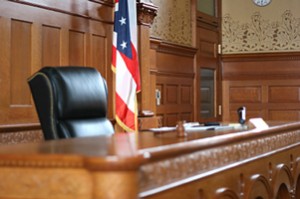Notebookventura@gmail.com
“A judge shall respect and comply with law and shall act at all times in a manner that promotes public confidence in the integrity and impartiality of the judiciary.” — California Code of Judicial Conduct
There are good judges, Baca and Bunton, come to mind and then, there are all others.
 It was a slow day in the newsroom in El Paso more than two decades ago when I got a call from District Court Judge Jose Baca’s secretary “Mo,” short for Maureen Bailey.
It was a slow day in the newsroom in El Paso more than two decades ago when I got a call from District Court Judge Jose Baca’s secretary “Mo,” short for Maureen Bailey.
“The judge wants to see you. It’s important,” she said.
“I’ll be over in an hour. I’m wrapping up a story.”
“He needs for you to come over right now,” she said. “It’s important.”
“Alright.”
I hit the send button and watched my story get swallowed up. Then grabbed my notebook, quickly put my sports coat on and walked to the state courthouse a few blocks away.
I get there. The judge’s door is closed. He never closes the door. I’m thinking either he is going to chew my ass out, I’m getting a grand jury subpoena or it’s a big story. Mo says, “sit down” and punches a couple numbers on the phone. “Judge, he’s here.”
“Go on in,” Mo said sternly.
I walk into his chambers and a very somber Judge Baca is sitting behind his desk. I walk in and I’m about to sit down. He says just above a whisper, “Close the door behind you.” I do that, now thinking, this is a 10 on the serious richter scale.
“What’s up, judge?”
“Sit down. Let me show you something.”
I sit. He opens a drawer, pulls out a bright, white handkerchief puts it on his desk and spreads it. Then he pulls out a small cardboard box, and he takes out a watch, and says, “Rolex.” He pulls out another Rolex and arranges them neatly on top of the handkerchief. Finally, two more expensive watches are taken out of the box.
“Wow, where did you get those?” I ask.
He leans back in his chair, slowly shakes his head and his face is bleak. He said the name of a prominent and well-known lawyer who was tight with the district attorneys, whom everybody suspected was a sleazy shyster. The judge uttered a curse word.
“Can you believe that? I’ve got one of his cases, and he gave me the watches for a favorable decision.”
“So what are you going to do?”
“There is going to be an investigation. It’s big,” he said before muttering a few more choice cuss words at this lawyer. “I just wanted to give you a heads up.”
My brain is doing summersaults. I am thinking Pulitzer. This is going to bring down the house, and I get to write about it. Woooow. But I keep my cool, maintaining a poker face, perfected through my years as a newspaper reporter.
Finally, I’ll be able to nail this scumbag attorney who many joked that he had the keys to the DA’s office. This story would be on the front page under a two-inch bold headline with details. I gently laid my eyes on the four watches and looked at the judge.
“So, who is investigating? Is the FBI involved?” I ask.
“The sheriff,” the judge said before he burst out laughing. It’s a prank. Red-faced, I feel stupid and grumbled.
Grinning, the judge who had recently returned from a trip to Indonesia purchased them for less than $30, and planned to give them to friends as gifts.
With my feathers ruffled, I left with the judge’s and Mo’s laughter echoing inside my head.
The Good Judges in Robes
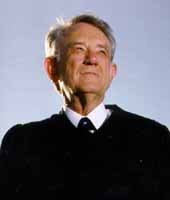
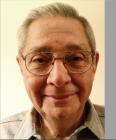
I’ve seen more than my share of judges in the more than 18 years of covering municipal, state and federal courts. Judge Baca and U.S. District Judge Lucius Bunton are on the top of a very long judicial list, as judges who epitomize integrity and fairness. They both hammered criminals who victimized the community, and both had a great sense of humor.
In Ventura County, California, Judges Vincent O’Neill and. Kevin J. McGee come to mind. Judges O’Neill and McGee are extremely well prepared, courteous, a calm demeanor on the bench and know the law backwards and forwards.
There are many good judges who put on the robes and understand that justice must sometimes be tempered with compassion. That they are dealing with people’s lives, and not everybody needs to be put in cages for the rest of their lives or for a very long time.
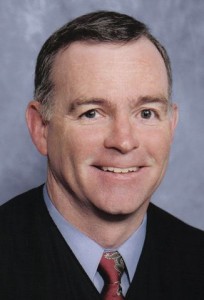
The Other Side of Justice
I’ve seen the other side too: The robed clowns who sit on the bench and act like carnival barkers. Those who sit in judgment of others but are nothing more than witnesses for the prosecution. The pompous asses who love getting their egos stroke and lamed jokes laughed at by mealy mouth lawyers shopping for favorable rulings.
There are the rubber-stamps who work for the DA’s offices and run judicial assembly lines, and the political hacks who are on the bench simply to advance the philosophy and talking points of the conservative or liberal political party.
Then, there are the robber baron magistrates. The robed bobbleheads that serve as the guardians of the municipal cash registers. These are usually desperate and struggling lawyers who sit on the bench because they are lousy lawyers and can’t find clients. So they agree that for a price, they will don the robes and sit in traffic or small claims courts.
Or this judicial task is handled by an aging, retired judge who works part-time in these courts, clowns like former Ferguson Judge Ronald Brockmeyer
They pretend to mete out justice in exchange for a fat government paycheck. Their sole purpose, in many cases, is to generate revenue to maintain the fat salaries and perks of those working in the criminal justice system or augment the revenue in the city coffers.
Criminals and Bad Drivers
Some of the right-wing mantra is this: Minorities commit most of the crimes.
So, of course, this means that minorities are also bad drivers. In most cities, there is a disproportionate amount of Hispanics, Blacks and Asians waiting to see judges in Traffic Court.
The majority of those in traffic and criminal courts in El Paso are Hispanic, and this is because 80 percent of the population of nearly 800,000 is Hispanic. The city, which sits on the border with Juarez, which was once considered the murder capital of the world, is considered one of the safest cities of its size in the United States.
In Ferguson the city where Michael Brown was killed, the Department of Justice reported that Blacks accounted for 85 percent of traffic stops, 90 percent of tickets and 93 percent of arrests over a two-year period studied by investigators.
In cases like jaywalking, which often hinge on police discretion, blacks accounted for 95 percent of those charged. A black motorist in Ferguson was twice as likely to be searched, according to the report, even though searches of whites turned up drugs and other contraband more often, the Department of Justice reported.
A New York Times report stated “Ferguson, a city of 21,000, is unusual in some respects — it has issued the most warrants of any city in the state relative to its size, for example — but the unfairness in its court system that the Justice Department highlighted is not limited to it, to St. Louis County or even to Missouri.”
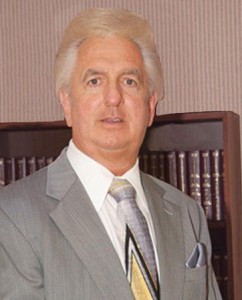
The Department of Justice criticized then Judge Brockmeyer for acting as a revenue generator for the court and the city, helping to bring in millions through “creative” use of fines and fees, while dismissing tickets for himself and friends, according to the St. Louis-Post Dispatch.
The report also criticized him for instilling fear in traffic defendants, even jailing one for 10 days because the man refused to answer questions in court.
By the way, this judicial jackass ,who was browbeating and threatening Black motorists, owed more than $170,000 in unpaid taxes, the Guardian reported
DOJ finds Ferguson targeted African-Americans, used courts mainly to increase revenue
Clowns in Judicial Robes
Then, there are the bigots in robes like Charleston Judge James Gosnell, and the judicial pretenders like Judge John O’Donnell of Cleveland
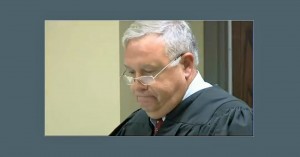
Gosnell in 2003 held a bond hearing for a Charleston shooting Black suspect where he made a racial slur during the hearing. He was disciplined for what he said.
Fast forward to 2015, Gosnell said there should be sympathy for the family of Dylann Roff who is accused of killing nine people who had invited him into their church.
This was the work of an evil racist who sat at a Bible study group with those who welcomed him when he walked into their church. Who sat there for an hour and heard the Word of God before he executed his hate-filled plan, opened fire and killed nine people.
People whose families forgave this killer and didn’t utter a vicious or hateful word against him.
Also in 2003, Gosnell helped out a fellow judge who was arrested for DUI and having an open container in his vehicle. Gosnell did everything he could to help the other judge speed through his bond hearing so he could be released, but did not comply with an administrative order to give bond hearings to all other incarcerated individuals.
The Rigged Judicial Game in Cleveland
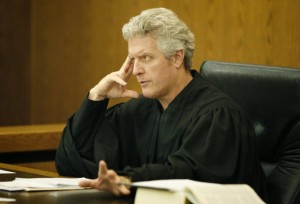
The robed pretender in Cleveland, Judge John O’Donnell, recently found a cop not guilty in the deaths of two unarmed suspects.
Afterwards and to his credit, the prosecutor, Timothy J. McGinty of Cuyahoga County, said in court documents that were posted on The Plain Dealer newspaper website that Judge John O’Donnell’s reasoning in the voluntary-manslaughter trial of Officer Michael Brelo could set a legal precedent that would “endanger the public.”
The newspaper stated that McGinty said Officer Brelo’s acquittal on May 23 in the 2012 deaths of Malissa Williams and Timothy Russell in a storm of police bullets was based on the judge’s mistaken analysis of laws concerning police use of deadly force and on homicide involving more than one person who fired shots. He said the judge had also considered the wrong lesser charge — felonious assault — when he should have considered attempted voluntary manslaughter or aggravated assault.
This is a cop who stood on the hood of the car and fired through the windshield. This is the Cleveland Police Department that is under federal scrutiny.
Prosecutors contend O’Donnell erred by:
- Misinterpreting a legal test for determining who causes a death, and concluding that it was impossible to determine that Brelo fired the fatal shots;
- Wrongly applying the law that determines when an officer is justified in using deadly force; and
- Considering the wrong lesser-included offense. O’Donnell considered felonious assault. Prosecutors argued the correct lesser offenses in this case are attempted voluntary manslaughter and aggravated assault.
The newspaper stated in its reporting:
In his verdict, O’Donnell concluded that prosecutors failed to prove that Brelo’s actions caused the deaths of Williams and Russell because several other officers on the scene also fired lethal shots.
O’Donnell further concluded that Brelo was justified in his use of force throughout the shooting because he feared for his life.
O’Donnell’s not guilty decision can’t be reversed. But prosecutors argue O’Donnell can amend his verdict to prevent flawed legal logic from being used in any future cases, according to the newspaper.
I have seen judges run these rigged judicial games, and it is usually for the benefit of prosecutors.
The Cincinnati Shooting of a Black Motorist
It shouldn’t be a surprise that the criminal lawyers for Officer Ray Tensing will start judicial shopping and looking for a local version of Judge John O’Donnell to hear the murder case.
In July, Tensing, 25, spotted a car driven by 43-year-old Samuel DuBose and a struggle ensued after DuBose refused to provide a driver’s license and get out of the car. Tensing shot DuBose in the head.
Tensing said he was dragged. Two other officers also backed up his story until it was time to testify under the penalty of perjury before the grand jury. Then, the two changed their minds about the dragging, which they reported in the did occur.
Tensing’s criminal lawyers will probably seek a bench trial with a judge who dances to the Police Union tune and isn’t looking beyond his next election and for years has been getting police union’s “tough on crime” Good Housekeeping Seal of Approval.
It is no secret: the object of attorneys and prosecutors is to play the criminal justice system. This means finding a robed one who will twist the law like a pretzel and make a square peg fit into a round criminal-justice hole. Someone who will sprinkle some judicial razzle-dazzle like Judge O’Donnell when rendering a verdict like to “justify” to get a favorable decision.
By the way, Tensing has pleaded not guilty and wants his job back, according to CNN
Minorities on the Bench
The judicial brotherhood is a tightly knit group like police departments.
The judicial brethren — mostly white and mostly male — are always finding excuses as to why they can’t find enough minority lawyers qualified to sit on the bench, qualified to be like the Gosnells and O’Donnells of the Robed Club.
In California, the land of free-range chickens and organic gardens, the number of minority judges was somewhat pathetic in 2012 when I wrote an article for the Ventura County Star:
There were 1,677 judges in California last year, according to the sixth annual report from the Judicial Council of California, Administrative Office of the Courts. The report, released in March, shows that of those judges, 1,212 are white, 137 are Hispanic, 96 are African-American, and 94 are Asian. The rest are other races, listed more than one race or didn’t provide information.
In 2006, 6.3 percent of California judges were Hispanic, while 8.2 percent were Hispanic last year.
The report also states that 68.9 percent are men and 31.1 percent are women. Women represented 27.1 percent of the judiciary in 2006.
Minorities account for 57 percent, or 22.3 million, of California’s 37 million people, according to the census. Two-thirds of the minority residents are Hispanic.
On the bright side, Gov. Jerry Brown has been appointing minorities to the bench in big numbers. The governor cut through the insulting BS and found many qualified minorities that wanted to serve on the bench.
The numbers are still very low compared to the minority population in the state.
The FBI Case and Judge Lucius Bunton
I loved going into Judge Bunton’s court.
Judge Bunton, who is deceased, was a private with the 76th Infantry Division in World War II.
He always had this half smirk, half smile while on the bench. But his golden rule —people had to wear a coat and tie, and he didn’t like lawyers who were trying a case to “prance” around his courtroom.
“Lawyers love to prance. They prance up to the witness stand, prance around court and to the jury box. I don’t like that,” Bunton once told jurors. “I give them two trips to the witness stand. Otherwise, I keep them behind the lectern.”
Judge Bunton was known for his so-called docket rocket. He tried cases quickly and efficiently. When long-winded lawyers would line up behind the lectern after filing and start to open their mouths, he’d say, “I read your brief. Denied. Sit down.”
When he ruled in their favor he’d ask a few questions, and then, make his ruling. He had very little patience for attorneys who were trying to impress their clients or score, mindless points with the jury.
“Ask the question so everybody can understand. In simple English. Not everybody went to law school,” he’d chide lawyers.
Bunton presided in the racial discrimination case against the FBI involving more than 300 agents. He ruled in favor of the agents and against the FBI. He couched his judicial opinion in that case with quotes he lifted from the Bible about justice.
The Other Good in Robes
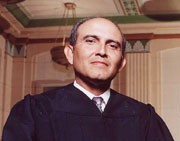
U.S. District Judge Phil Martinez in El Paso is a humble Harvard University law graduate with a big heart, but he can be tough too.
Last month, he nailed a probation officer who was also a gang member for sex trafficking juveniles and adults. He gave the pimp 22 years, according to federal officials.
I knew the judge when he was on the state bench in El Paso. The federal robes, which instantly transform some men into gods, haven’t changed him.
I quietly slipped into his courtroom in September and watched as groups of desperate illegal immigrants stood before him to plead guilty to sneaking into the country.
Patiently, he explained to them that he understood their plight, desperation and reasons for coming to the United States. But he said it was still a crime to do so, sentenced them and urged and pleaded with them to go home after they are released from custody and not return.
Judge Martinez never ran a judicial assembly line. His words were still sincere, heartfelt.


